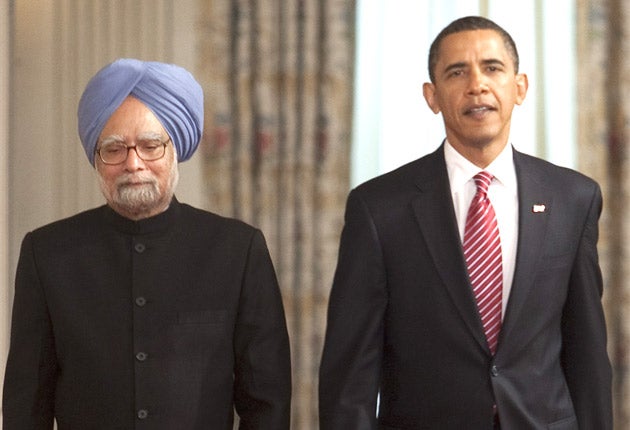America allays Indian fears of neglect with lavish state dinner

With lavish food, a live performance by the singer Jennifer Hudson and hours of face-to-face talks, President Barack Obama worked to uphold a tradition of grand hospitality to visiting Indian leaders in Washington while allaying nervousness in Delhi about the future of US-India relations.
Business – in particular, the war in Afghanistan, turmoil in Pakistan and climate change – mixed with pomp as the Indian Prime Minister Manmohan Singh paid a state visit to the White House. An evening gala for 320 guests in a marquee on the South Lawn was to be the first state dinner hosted by Mr Obama.
Indian leaders have become accustomed to a high level of attention on state visits to the US, dating back to a formal feast for India's first prime minster, Jawaharlal Nehru, with Harry Truman hosting. Mr Singh was honoured with one of very few state dinners hosted by George W Bush, during a visit in 2005.
But however flattered he may have been on this occasion, Mr Singh's main concern was extracting reassurances from Mr Obama on the future of the relationship between their countries. He left for the US amid a storm of media commentary at home that Mr Obama, after his trip to China, was putting Beijing before Delhi in the Asian pecking order. At the root of the controversy was a joint statement after the China visit, saying China and the US would "work together to promote peace, stability and development" in south Asia, the region India has long considered its bailiwick. The statement raised fears in Delhi that India was being cast as a slightly less important part of the strategic jigsaw in the region.
The concern was fuelled by the impression that links with the US were stronger under President Bush, who oversaw a nuclear pact between the countries.
"There is a feeling that, in Obama's international calculations, India is not all that important," Lalit Mansingh, a former ambassador to the US, said before yesterday's state visit. "The suspicion is building up that Obama is not as keen on partnership with India as George W Bush was."
Mr Obama did his best to soothe matters. "The US and India are natural allies not just around counter-terrorism but around a whole host of issues," he said at a joint press conference with Mr Singh, noting also the "incredible contributions that Indians have made to the growth" of the US.
Join our commenting forum
Join thought-provoking conversations, follow other Independent readers and see their replies
Comments
Bookmark popover
Removed from bookmarks